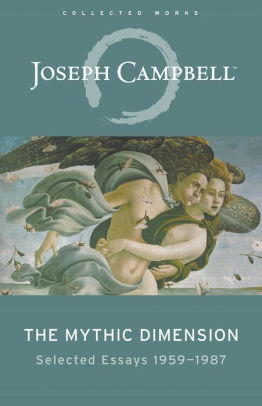The ten essays in this collection (hardback edition in 2007, paperback 2017) were published in scholarly journals and essay collections and are otherwise unavailable. The themes in these pieces fill in some of the gaps between Campbell's major books.
There are two topical sections: Mythology and History; and Mythology and the Arts. The first section includes an introductory lecture to his Comparative Mythology class at Sarah Lawrence College. “The Historical Development of Mythology” reflects on the expansion of myth through archeology, especially as it reveals new views of oriental, occidental, and poetic myths. A meaty and lengthy essay on “Renewal Myths and Rites” discusses archeological evidence from Neolithic and Paleolithic periods.
“Johann Jacob Bachofen” relates biographical details of this 19th century mythologist who was largely misunderstood and unappreciated during his own time. The final essay in the first section “The Mystery Number of the Goddess” is a thorough expostulation of numbers sequences that are highly persistent throughout world mythologies. These numbers link the precession of the equinoxes to human physiological processes.
Mythology and the Arts begins with a short essay on “Creativity.” “The Interpretation of Symbolic Forms” focuses on the role of symbolism in religious doctrines. Campbell explores the psychological and spiritual truths hidden within religious mythologies. The two final essays are “The Occult in Myth and Literature” and “Erotic Irony and Mythic Forms in the Art of Thomas Mann.”
The collection is appended with the reading list for Campbell's class on mythology at Sarah Lawrence College, end notes, a bibliography of Campbell's works, an index, and a short biography of the author.
The writing is dense and scholarly. Campbell's subjects are complex because he intertwines multi-disciplinary material from myth, psychology, comparative religion, archeology, some anthropology and sociology, and in some cases, astronomy. The collection is valuable for its focus on specific topics not treated by Campbell in his other works. Some of the ideas presented in essays from the 1950s-70s have dated thinking. Essays from the 1980-90s (published posthumously) benefit from discoveries that occurred toward the end of Campbell's life (particularly the works of archeologist Marija Gimbutas).
The reader may or may not agree with all of the mythic connections the author makes. Campbell drives toward a unified field theory of mythology that is, at times, too reductionistic. In spite of this, the essays encapsulate Campbell's singular talent for delineating coherence in mythic lore from numerous global cultures. He adeptly reveals mythic allusions in the works of 19th and early 20th century philosophers and writers, particularly James Joyce and Thomas Mann. At multiple points, Campbell derides the dogmatic tendency to regard the Bible as an accurate historical document. Like Jung, Campbell was of the opinion that myths are psychological and spiritual.
This collection is recommended for anyone interested in comparative mythology, for library collections, and for people researching any of the particular themes presented in these essays. Fans of Joseph Campbell will be grateful for these hidden gems.
~review by Elizabeth Hazel
Author: Joseph Campbell
New World Library, 2007 hb/2017 pb
348 pgs, $18.95 pb
The Mythic Dimension: Selected Essays 1959-1987

©
2010 - 2025
Facing North
